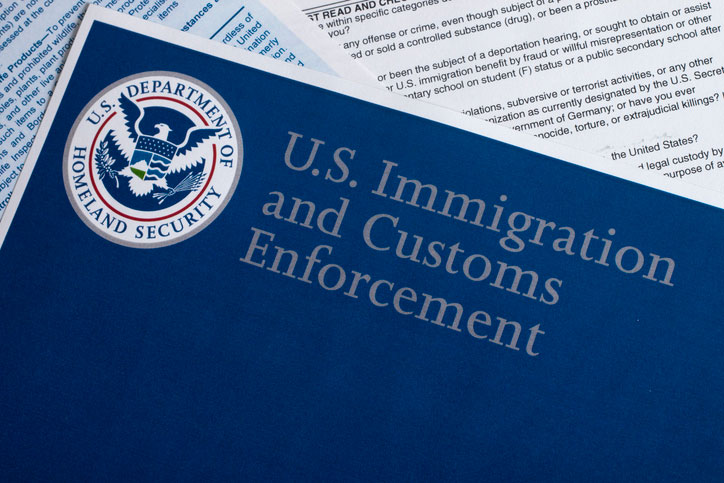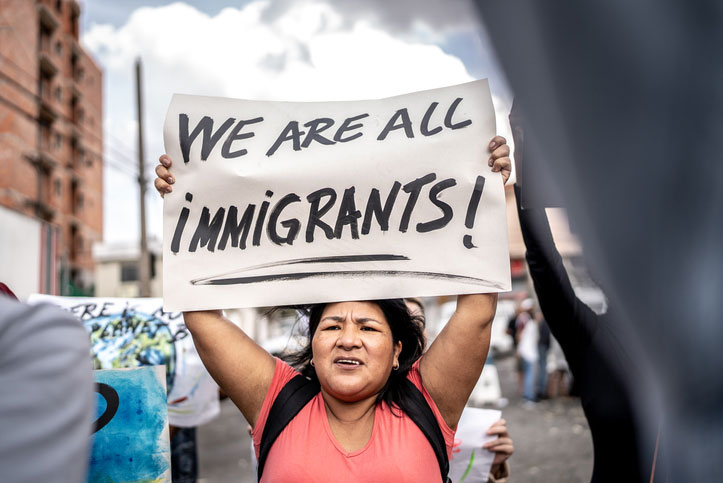Written by Scott Wilson
They started lining up on November 6, before the TODEC Legal Center in Riverside even officially opened for the day.
Among them were a cross-section of Californians any local social worker would recognize:
Legal permanent residents in the community urgently trying to apply for permanent citizenship … A woman in the country illegally whose children were afraid to go to school in case she were found and deported while they were gone … A man afraid to go to work where he could be seen and perhaps detained … Refugees in the country worried that the fact their home addresses were on file with the federal government could make them easy targets in deportation sweeps.
While it’s a scene from a movie for many Americans, some of these people come from countries where it wasn’t entirely uncommon for government agents to pull you from your bed in the dead of night.
With a zero tolerance immigration enforcement policy looming as the Trump administration takes office, it is now likely to be all too real for undocumented people living right here in California.
History May Not Repeat, but It Sure Does Rhyme
For social workers in the Golden State, this is deja vu all over again. Trump’s first term came with plenty of anti-immigrant fervor.
The poorly conceived Muslim ban fizzled under a withering assault of Constitutional legal arguments pressed by non-profits and state attorneys general, including California’s. It then went away entirely on January 20, 2021, when Joe Biden took office.
But all of it was only a preview of what is likely to be the most expansive program of its kind in modern history.
California Is a Prime Target for Anti-Immigrant Sweeps

California is likely to be ground zero.
Trump and his proxies have repeatedly held California up as an example of mismanaged liberal failures and a state overwhelmed with immigrant criminality. During an administration that prized loyalty above all else, California’s failure to suck up all but ensures that it will have a target on its back for the next four years.
Moreover, as a self-declared sanctuary state, with laws on the books that prevent local law enforcement from being used as agents of federal roundups, California is at the top of the list for immigration enforcement sweeps.
They’ll come for California’s immigrant population first.
It’s also the most diverse state in the nation, more than 40 percent Hispanic and has the highest proportion of actual immigrants in its population.
Worse, most of California falls within the 100-mile Border Zone. This area, carved out by judicial precedent, is a buffer around land and sea borders in which the Border Patrol enjoys expanded powers of search and seizure.
How California’s Social Workers Are Preparing for the Coming Sweeps

With both the lessons of recent history under the last Trump administration as well as a lengthy list of campaign promises and policy proposals, social workers have had fair warning. They have had time to put together a playbook and make plans for how to resist the tactics most likely to be used in immigrant roundups.
Attorney General Rob Bonta has put staff to work preparing filings for legal challenges that will need to be mounted against proposed immigrant sweeps.
Earlier in 2024, the state passed legislation allowing county health workers access to federal immigration detention centers. While they have no real authority to relieve unsafe and unsanitary conditions, they can at least shine a light on the worst abuses that could occur in such facilities.
The scale of the proposed sweeps is so big that it’s almost impossible to pull them off without significant private sector support. California has a proven track record of inspecting and fining the kind of for-profit prison operators who are likely to be involved in those efforts. It also hasn’t been shy about using state law to take a swing at the federal use of such facilities.
Social workers are also pressing the governor, who has sole authority to offer pardons for California state criminal prosecutions, to begin pardoning immigrants with very old criminal convictions. This could help shield them from the first waves of sweeps, which are likely to focus on convicts, even those who have been rehabilitated.
There Will Be Work for Immigration Social Workers Even Before Any Roundups Begin
More immediately, social workers have to cope with the impact of rhetoric likely to come from the White House denigrating and vilifying immigrants of all kinds in California.
Incendiary language targeting Muslims, Chinese, and immigrants in general have been shown to be correlated to spikes in violence against each of those groups. Without a single federal deportation action, right-wing groups in California or surrounding states could engage in independent action against immigrants.
Immigration social workers are well aware that this isn’t going to be a well-reasoned process — just looking or sounding different is enough to make people targets. That means the problem isn’t restricted to social workers who specialize in working with immigrant populations. Many parts of the field can expect an uptick in issues:
- School social workers
- Mental health social workers
- Medical and healthcare social workers
- Housing and job assistance social workers
A History of Victory Comes With California Social Workers Supporting Immigrant Rights
One massive positive for social workers in California who are staring down the barrel of four plus years of relentless persecution is that the state government, at least, will have your back. When you compare the position to that of social workers in Texas, Florida, Arizona, or other immigrant-heavy parts of the country, that’s a real advantage.
In December, Governor Newsom called the legislature back into special session expressly to develop additional safeguards against federal overreach under Trump.
It’s also the case that social workers here benefit from MSW programs that explore the long history of anti-immigrant movements the state has gone through. From the Chinese Exclusion Act to Prop 187, there’s nothing in the current moment of bigotry and intolerance they haven’t already learned about or fought against.
That preparation also brings hope: for all that the moment may seem dark, they recognize that our better angels eventually shine through. Still, it’s a good time to review self-care resources and consider how to maintain positivity through the crisis.
California’s Social Workers May Win Simply by Resisting
While state and social services non-profits can only do so much to tie down the federal government in court, those efforts can help in one other way: they can drain resources from active deportation efforts.
The proposed number of those deportations range into the millions. But nothing happens for free; the average cost per removal in 2016, just before Trump took office last time, was almost $11,000.
With inflation and the additional complexity of logistics in the post-COVID world, those costs have only gone up. The American Immigration Council estimated that the cost of removing 1 million immigrants per year over the course of a decade could be $960 billion… the same as the entirety of the federal budget deficit for 2019.
The money to pay for it doesn’t come out of thin air, and the removals don’t happen overnight. Every dime the federal government incurs in court costs and every day that a removal is delayed will work against the effort.
Of course, this is expected to work in both directions. Incoming administration officials have promised to punish sanctuary states and cities by unilaterally stripping away federal funding they receive for everything from law enforcement to healthcare.
The average Californian pays $5 in federal taxes for every dollar in benefits they receive… reducing their income will reduce federal revenues for funding ICE.
But they may get an ugly surprise when they come after California, which is the largest state economy in the country and therefore the largest single contributor of revenues to the federal government.
So any systematic attack against the California economy through forced deportations will ultimately cut the resources available to conduct those deportations.
It promises to be turbulent era for social workers of all kinds in California. But, as in all such times, social workers are exactly the ones who will shine light to show the way forward.





